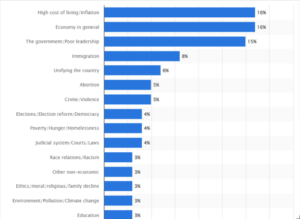
Marty Levine
January 4, 2023
As 2022 came to end I found myself drawn back to a subject that I have often written about – mega-philanthropists. I opened up my daily briefing from the Chronicle of Philanthropy to find they were leading with a story headlined: “Top 10 Donations of 2022 Totaled $9.3 Billion.”
“The contributions went to large, well-established institutions, three of them private foundations and three universities to support environmental sustainability, children’s mental health, and stem-cell research. The other gifts backed cancer research and treatment, housing efforts, youth programs, and reproductive health.
“Two of the gifts exceeded $1 billion, and six of the eight donors (one donor made three gifts) are multibillionaires. The combined net worth of those six donors is just over $325 billion.”
Almost $10 billion is serious money. Digging further down their list of top donations in the past year you will find another 15 donors who made gifts of at least $100 million.
As I thought about those numbers, I was concerned about the ability 8 individuals to make such staggering gifts to charities. I have been concerned about their ability to do this, with money we had partially given them by our granting of tax deductions for charitable giving, without public input or control.
Deciding the priorities for a nation of more than 334 million people should be is not an easy task. But it seemed important to me to look at how these large charitable investments reflected on our national priorities. If we were going to reward donors with favored tax status and public acclaim should not their funding align with the broader perspective of the nation?
So, in this season of “top 10 lists” I turned to the internet to look for lists of the significant problems facing the United States to find that perspective and to learn what, from various perspectives, was deemed to be important.
And then I ran into the troubling reality that we have little national agreement on what is important. We do not agree on what problems need to be tackled now and what strategies are to be tried.
Statista.com, relying on recent Gallop survey data, offered one perspective of the nation’s priorities. But the top two items on their list were chosen by only16% of the sample! It is an interesting list but it tells us more about how disparate public opinion is than what our national directions should be.

A list put out by the conservative Heritage Foundation gives us a different perspective. “Conservatism Vs Progressivism” ranks number one followed by health care, immigration, religious liberty, marriage, education, environment, spending, welfare, and election integrity.
At World Atlas. Com, I found a list more to my progressive tastes. It leads off with poverty; health care; climate change; racism; gun control; immigration; terrorism; education; discrimination; and crime, to fill out their top ten.
To illustrate how ideologically skewed we are as a nation, take a look at an AP- NORC Center for Public Affairs Research report that provides priorities based on voter party affiliation:
Democrat’s top 5:
- Environment/climate change
- Gun issues
- Economy (general)
- Inflation
- Education
Independents’ top 5:
- Inflation
- Economy (general)
- Unemployment/jobs
- Immigration
- Health care reform
Republicans’ top 5:
- Immigration
- Inflation
- Economy (general)
- Crime/violence
- Gas prices/oil/energy costs
To make things even more challenging remember that these are lists of problems, not strategies for solutions!
Getting a consensus on what we should do about the problems that we might actually be able to agree to jointly work on is even more complicated than just getting an agreement on what problems are most critical.
As an example of this complexity consider the environment which finds a place on many of these lists. While there might be agreement on a problem, there is little agreement on the solution as reflected in the various options that follow.
One view, indicated in the Heritage Society’s materials sees the free market as the answer. “(G)overnment should focus on keeping the economy strong by reducing taxes and eliminating regulatory barriers to energy innovation…competitive electricity markets can give consumers the option to buy 100 percent renewable power if they like…fixing a broken regulatory system will allow new, innovative commercial nuclear technologies to get off the ground. This is how we can ensure affordable, reliable, and cleaner energy. It’s how we can keep our economy growing. And ultimately, it’s how we can ensure a cleaner environment for America.”
A different perspective, one that sees the need for active governmental intervention, and does not see the market as able to bring the changes that are necessary is reflected in a recent report from the Democratic members of the US House of Representative’s Select Committee on the Climate Crisis. It “calls on Congress to build a clean energy economy… [through]comprehensive congressional action to satisfy the scientific imperative to reduce carbon pollution as quickly and aggressively as possible, make communities more resilient to the impacts of climate change, and build a durable and equitable clean energy economy. To succeed, Congress needs to put people and communities at the center of climate policy so they can see and experience the tangible benefits of climate action for their health and livelihoods.”
This is but one issue and only two perspectives. Multiply that by the number of issues that are important and the number of potential solutions that might be considered by various advocates and you get a picture of how difficult it has become to make national policy.
When I began researching this piece, I was ready to be my hyper-critical self and bash these rich men and women for being out of step with the public’s interest. And then I saw the chaos that is public opinion about national priorities and actions.
Perhaps my criticism over the years of large philanthropy was wrong. Perhaps, private action and philanthropy is our only way of stimulating needed changes.
With a democratic process as polarized as ours is, it seems to be a herculean challenge to see our government lead the way to anything but the status quo even if that is failing us. Getting agreement on anything in Washington has been difficult at best. And with 2023 beginning with a Republican-controlled House and a Democratic-controlled Senate, it is likely that almost nothing of substance will be done on any issue of significance.
Perhaps this is really our only hope.
Rather than continuing to advocate for systemic changes and big direction swings at the national governmental level our focus might be better turned to attract members of the small group of mega-donors to the progressive side of the ledger. At least then there is a chance for large amounts of funding coming to organizations working in the “right” direction and mitigating the harms I know need mitigation.
But I am still troubled. Should the setting of priorities, even those that would be on my personal list of important problems to be solved by solutions I think are effective and moral, be left to the whim of one man or woman?
Is that the best we can do? And with that question still floating out in front of me I end this piece still concerned, but less focused on individual rich people and more concerned that our nation and its experiment in building a society where, supposedly, “all (wo)men are created equally” remains at risk.
